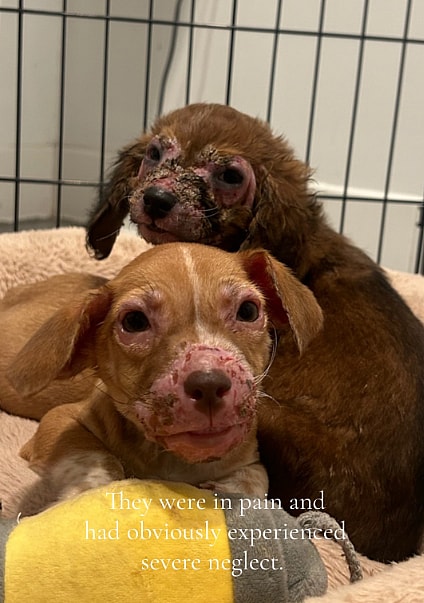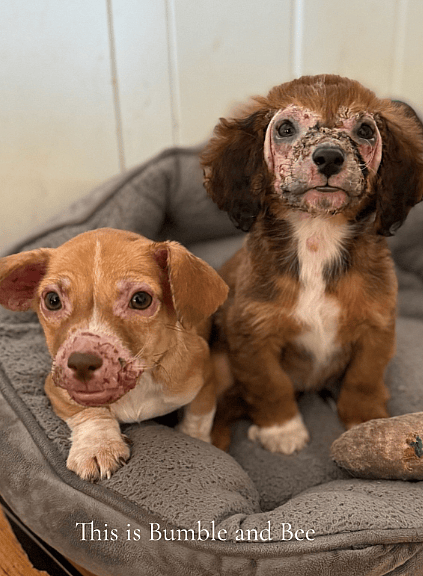Puppy Strangles: How 2 Dogs Are Defying the Odds Against This Rare Disease
Two puppies, Bumble and Bee, are battling for their lives after enduring extreme neglect and severe health conditions. The pair is suffering from puppy strangles, or juvenile cellulitis, a condition that causes facial swelling, fever, hair loss, and loss of appetite. Left untreated, the illness can be fatal.

The puppies’ plight came to light when they were found in a shelter, their chances of survival dwindling. Pet rescue advocate Rocky Kanaka expressed the urgency of their situation, stating, “Bumble and Bee are little puppies; they need comfort and love and deserve to be pain-free, which is what just breaks my heart.”
Rescue Received A Desperate Plea
In response to an emergency plea from the shelter, Los Angeles-based Wags and Walks Rescue, stepped in to help. The organization took the puppies under their care, committing to the intensive treatment required to address their condition.

Thanks to the rescue’s intervention, Bumble and Bee now have a chance at recovery. While their journey will be long and fraught with challenges, the dedication of their caretakers offers hope that these puppies will overcome their ordeal and find a future filled with comfort and love.
Rocky Kanaka, a pet rescue advocate, shared his thoughts on the puppies’ situation: “When I saw Bumble and Bee’s condition, it was devastating. No animal should have to suffer like that. But knowing there are rescues like Wags and Walks stepping up gives me hope that we can turn their story around.”

Fortunately, Bumble and Bee are now receiving the necessary treatment and care for their condition. Although their road to recovery will be long and challenging, the rescue’s dedicated efforts provide a promising outlook for these resilient pups to make a full recovery.
You Can Help Too—Donate To The Rescue
The rescue is committed to saving Bumble and Bee and providing them with the consistent medical treatment required for them to recover. Apart from these puppies, they also have many other medical dogs they are determined to help.

They cannot do this on their own and need sufficient funds to continue being a savior for dogs in need. If you’re able, you can donate using this link and help them reach their goal of $75,000. A generous donor will match every dollar donated, up to $20,000.
What is Puppy Strangles or Juvenile Cellulitis in Dogs?
You may not be familiar with Bumble and Bee’s condition, known as puppy strangles or juvenile cellulitis, as it is relatively rare. Veterinarians Dr. Malcolm Weir and Dr. Catherine Barnette described it as “an uncommon skin condition,” that “affects young puppies, up to six months of age.”
Although unusual, the puppy strangles disease can also impact young adult dogs, with reported cases in dogs as old as four years.
Causes
Also known as sterile granulomatous dermatitis and lymphadenitis, the exact cause of juvenile cellulitis remains unknown, and the condition is currently considered idiopathic. However, research suggests that it involves an immune-mediated component, where the puppy’s immune system mistakenly harms its own skin.
In addition, there may be a genetic component to juvenile cellulitis, as certain breeds and family lines are more prone to the condition. Golden Retrievers, Gordon Setters, and Dachshunds are among the breeds that appear to be at higher risk.
Symptoms of Canine Juvenile Cellulitis or Puppy Strangles

“The first sign of juvenile cellulitis is usually an acute (sudden) swelling of the face and muzzle. This generalized swelling is followed by the development of raised bumps and pustules over the face, muzzle, and ears,” Dr. Weir and Dr. Barnette stated.
As the disease progresses, the pustules on the skin may rupture and form crusts, leading to heavy scabbing in the affected areas. In severe cases, especially when lesions develop around the eyes, permanent scarring can occur.
Dogs with juvenile cellulitis may also exhibit swelling under the jaw due to swollen lymph nodes. In advanced cases, the swollen and tender lymph nodes may rupture and drain, leading to oozing tracts and openings in the skin.
In some cases, the affected puppies may seem sluggish and disinterested, with a noticeable decrease in energy levels. Loss of appetite is common, and they might feel feverish and warm to the touch. In less frequent cases, joint pain can lead to limping.
Diagnosis of Puppy Strangles or Juvenile Cellulitis
The first step to diagnosing puppy strangles is a physical examination and looking for symptoms like facial swelling, enlarged lymph nodes, fever, and painful skin lesions.
As per Dr. Katie Grzyb, your vet may perform the following tests to confirm the condition:
- Bloodwork: To check for elevated white blood cell count and anemia.
- Skin cytology: To identify secondary bacterial infections.
- Skin scrapings and hair pluck tests: To rule out other skin conditions like mange, fungus, and ringworm.
- Bacterial or fungal cultures: To identify any infections.
- Skin biopsy: In rare cases, a skin biopsy may be necessary for a definitive diagnosis.
Juvenile Cellulitis or Puppy Strangles Treatment
Puppy strangles can be serious. The condition is painful and leaves your dog susceptible to bacterial infections. If these infections worsen or your dog stops eating due to pain, strangles can be life-threatening.
Reddit user, u/FoolOfASausage, discusses how their pup was treated for puppy strangles. They write, “My pup was on prednisone for 4 weeks. My vet told me puppies that develop Strangles usually need to be on a course for 4-6 weeks to ensure the immune system stops going haywire. If they’re taken off too early, it can just resurface. If you stick it out while they’re on meds, it should resolve itself.”

According to Dr. Grzyb, treatment options are highly effective. Treatment aims to suppress the overactive immune system of your dog and reduce inflammation. Your vet might prescribe:
- Corticosteroids: Like Prednisone, to suppress the immune system.
- Immunosuppressants: Such as Cyclosporine.
- Antibiotics: To treat bacterial infections.
- Pain medication: To alleviate discomfort.
Your vet will gradually reduce the steroid dosage as your dog improves.
Frequently Asked Questions (FAQs)
Is puppy strangles contagious?
No, puppy strangles (juvenile cellulitis) is not contagious to other dogs or humans.
How to treat puppy strangles at home?
According to the American Kennel Club, topical treatments like medicated shampoos, hot packs, or creams can soothe your dog’s skin. It’s recommended to always consult your vet before applying them, as some may worsen the condition.
Can a puppy survive strangles?
Primarily affecting puppies, most cases of this disease are treatable but delayed treatment can have long-term effects. If not treated in time, it can lead to the dog’s demise.




